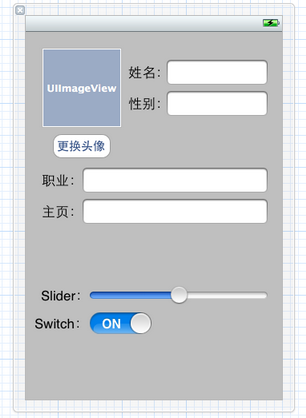iOS开发UI篇—ios应用数据存储方式(归档)
想要永久保存数据,我们当然可以使用plist文件,当退出程序时,我们执行将数据写入plist文件的操作,使用writeToFile:atomically:方法。
具有这个方法的类有:
NSArray NSMutableArray NSDictionary NSMutableDictionary NSData NSMutableData NSString NSMutableString NSNumber NSDate
例如,我们的数据存储在NSArray的一个对象array中,保存数据时执行:
[array writeToFile:filePath atomically:YES];
其中filePath是放在SandBox中的一个plist文件的完整路径。
不过,使用plist文件还是有局限性的,例如,我们不好将一个图片存储在plist中。
这次的小例子中,我们将会通过归档实现数据的保存。当程序运行时,先检查归档文件是否存在,如果存在的话就从归档文件中读取数据显示在界面上;如果归档文件不存在,就使用默认设置。当程序关闭时,会将数据存储在归档文件中,这样下次运行程序时就会显示上次的设置了。
1、运行Xcode 4.3,新建一个Single View Application,名称为:Archiving Test:
然后将准备好的两张图片添加到工程中。
2、先进行界面设计:
单击ViewController.xib,向其中添加控件:
然后向ViewController.h中为控件建立Outlet映射和Action映射,具体是为所有的TextField、ImageView、UISlider控件和UISwitch控件建立Outlet映射,为Button建立Action映射:
3、新建一个类,用于存储我们的数据:
在菜单栏依次选择File — New — File…,在打开的窗口选择Objective-C Class:
单击Next,输入类名:ArchivingData,选择super class为NSObject:
单击Next,选好位置和分组,点击创建,完成类的建立。
4、打开ArchivingData.h,向其中添加属性,以及协议:
#import <Foundation/Foundation.h> @interface ArchivingData : NSObject <NSCoding, NSCopying> @property (copy, nonatomic) UIImage *image; @property (copy, nonatomic) NSString *name; @property (copy, nonatomic) NSString *gender; @property (copy, nonatomic) NSString *vocation; @property (copy, nonatomic) NSString *page; @property float theSlider; @property BOOL isSwitchOn; @end
5、打开ArchivingData.m,向其中添加代码:
5.1 在@implementation之前添加代码:
#define kImageKey @"ImageKey" #define kNameKey @"NameKey" #define kGenderKey @"GenderKey" #define kVocationKey @"VocationKey" #define kPageKey @"PageKey" #define kTheSliderKey @"TheSliderKey" #define kIsSwitchOn @"IsSwitchOnKey"
5.2 在@implementation之后添加代码:
@synthesize image; @synthesize name; @synthesize gender; @synthesize vocation; @synthesize page; @synthesize theSlider; @synthesize isSwitchOn;
5.3 在@end之前添加代码:
#pragma mark NSCoding
- (void)encodeWithCoder:(NSCoder *)aCoder {
[aCoder encodeObject:image forKey:kImageKey];
[aCoder encodeObject:name forKey:kNameKey];
[aCoder encodeObject:gender forKey:kGenderKey];
[aCoder encodeObject:vocation forKey:kVocationKey];
[aCoder encodeObject:page forKey:kPageKey];
[aCoder encodeFloat:theSlider forKey:kTheSliderKey];
[aCoder encodeBool:isSwitchOn forKey:kIsSwitchOn];
}
- (id)initWithCoder:(NSCoder *)aDecoder {
if (self = [super init]) {
image = [aDecoder decodeObjectForKey:kImageKey];
name = [aDecoder decodeObjectForKey:kNameKey];
gender = [aDecoder decodeObjectForKey:kGenderKey];
vocation = [aDecoder decodeObjectForKey:kVocationKey];
page = [aDecoder decodeObjectForKey:kPageKey];
theSlider = [aDecoder decodeFloatForKey:kTheSliderKey];
isSwitchOn = [aDecoder decodeBoolForKey:kIsSwitchOn];
}
return self;
}
5.4 在@end之前添加代码:
#pragma mark NSCoping
- (id)copyWithZone:(NSZone *)zone {
ArchivingData *copy = [[[self class] allocWithZone:zone] init];
copy.image = self.image;
copy.name = [self.name copyWithZone:zone];
copy.gender = [self.gender copyWithZone:zone];
copy.vocation = [self.vocation copyWithZone:zone];
copy.page = [self.page copyWithZone:zone];
copy.theSlider = self.theSlider;
copy.isSwitchOn = self.isSwitchOn;
return copy;
}
在ArchivingData类中,我们添加了几个属性,这些属性与上面创建的控件是一一对应的。之后实现了几个协议方法,这些方法分别用于编码、解码和复制。
6、打开ViewController.h,向其中添加属性和方法:
@property (copy, nonatomic) NSString *archivingFilePath; - (void)applicationWillResignActive:(NSNotification *)notification;
7、打开ViewController.m,添加代码:
7.1 在@implementation之后添加代码:
@synthesize archivingFilePath;
7.2 在#import之后添加代码:
#import "ArchivingData.h" #define kArchivingFileKey @"archivingFile" #define kArchivingDataKey @"ArchivingDataKey"
7.3 在viewDidLoad方法中添加代码:
- (void)viewDidLoad
{
[super viewDidLoad];
// Do any additional setup after loading the view, typically from a nib.
NSArray *paths = NSSearchPathForDirectoriesInDomains(NSDocumentDirectory, NSUserDomainMask, YES);
NSString *documentsDirectory = [paths objectAtIndex:0];
self.archivingFilePath = [documentsDirectory stringByAppendingPathComponent:kArchivingFileKey];
NSFileManager *fileManager = [NSFileManager defaultManager];
if ([fileManager fileExistsAtPath:self.archivingFilePath]) {
//如果归档文件存在,则读取其中内容,显示在界面上
NSData *data = [[NSMutableData alloc] initWithContentsOfFile:self.archivingFilePath];
NSKeyedUnarchiver *unarchiver = [[NSKeyedUnarchiver alloc] initForReadingWithData:data];
ArchivingData *archivingData = [unarchiver decodeObjectForKey:kArchivingDataKey];
[unarchiver finishDecoding];
theImageView.image = archivingData.image;
nameTextField.text = archivingData.name;
genderTextField.text = archivingData.gender;
vocationTextField.text = archivingData.vocation;
pageTextField.text = archivingData.page;
theSlider.value = archivingData.theSlider;
theSwitch.on = archivingData.isSwitchOn;
} else {
//如果归档文件不存在,则设置imageView为boy.png
theImageView.image = [UIImage imageNamed:@"boy.png"];
}
//当程序进入后台时,将当前设置项写入归档文件
UIApplication *app = [UIApplication sharedApplication];
[[NSNotificationCenter defaultCenter] addObserver:self
selector:@selector(applicationWillResignActive:)
name:UIApplicationWillResignActiveNotification
object:app];
}
7.4 找到switchImage方法,添加代码:
- (IBAction)switchImage:(id)sender {
UIImage *image1 = [UIImage imageNamed:@"boy.png"];
UIImage *image2 = theImageView.image;
if (![image1 isEqual:image2]) {
theImageView.image = image1;
} else {
theImageView.image = [UIImage imageNamed:@"gemini.png"];
}
}
7.5 在@end之前添加代码:
//程序进入后台时,保存设置
- (void)applicationWillResignActive:(NSNotification *)notification {
ArchivingData *archivingData = [[ArchivingData alloc] init];
archivingData.image = self.theImageView.image;
archivingData.name = self.nameTextField.text;
archivingData.gender = self.genderTextField.text;
archivingData.vocation = self.vocationTextField.text;
archivingData.page = self.pageTextField.text;
archivingData.theSlider = theSlider.value;
archivingData.isSwitchOn = theSwitch.on;
NSMutableData *data = [[NSMutableData alloc] init];
NSKeyedArchiver *archiver = [[NSKeyedArchiver alloc] initForWritingWithMutableData:data];
[archiver encodeObject:archivingData forKey:kArchivingDataKey];
[archiver finishEncoding];
[data writeToFile:self.archivingFilePath atomically:YES];
}
8、最后,为了使得键盘可以关闭,我们还要添加关闭键盘的操作,参考《iOS开发4:关闭键盘》中的第2步。
9、运行程序
刚运行程序如下左图:
我们添加一些数据,更换头像,再调整Silder和Switch,如上图右。
之后,按模拟器上的Home建,使得程序在后台运行。
此时,查看程序的SandBox,可以看到程序的Documents目录下出现了文件archivingFile:
之后使用Xcode结束运行,再运行程序。程序第二次运行时,显示如上图左,这说明我们实现了数据的永久存储。










